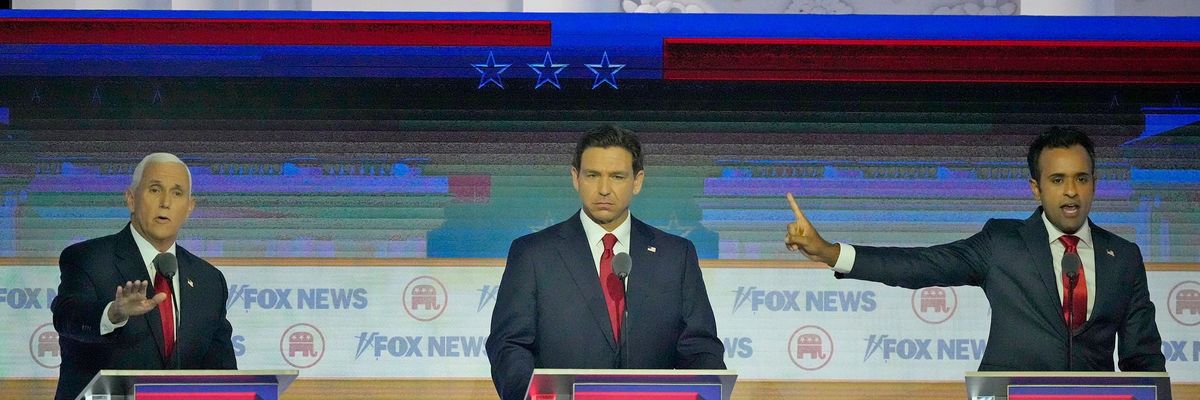Foreign policy issues typically don’t bring the house down during presidential debates, but the event Wednesday night certainly broke with that tradition, leaving proverbial blood on the floor amidst the Republican primary contenders for 2024.
In this case, it was pretty much Florida Gov. Ron DeSantis and entrepreneur Vivek Ramaswamy who took the biggest body blows from the traditional hawks, who, sounding right from central casting (or the year 2002), said Vladimir Putin is an evil murderer, and continued aid to Ukraine to keep fighting was the only moral and right thing to do.
It didn’t matter that the majority of Republican voters don’t want to send more aid to Ukraine, or that a compelling argument can be made — and has — that continuing unfettered arms supplies without a diplomatic track for a ceasefire would mean more deaths, more destruction, and more senseless brutality for Ukraine. Or that the war won't be won by giving Ukraine more HIMARS and tanks. These cases just weren't made by anyone on stage Wednesday night.
“The American president needs to have more clarity, they need to know the difference between right and wrong. They need to know the difference between good and evil,” charged former UN Ambassador Nikki Haley, referring to the two skeptics, DeSantis and Ramaswamy. “This guy (Putin) is a murderer and you are choosing a murderer.”
After Ramaswamy chided candidates for making the “pilgrimage” to “their Pope Zelensky without doing the same thing for people in Hawaii or the Southside of Chicago,” former New Jersey Gov. Chris Christie seized the moment. “I went to Ukraine, because I wanted to see for myself what Vladimir Putin’s army was doing to the Ukrainian people,” he said.
“I want you all to look around this arena tonight. And imagine that every one of these seats was filled and if every one of them was filled, there would still be 2500 more children outside to make over 20,000 who have been abducted, stolen, ripped from their mothers and fathers and brought back to Russia to be programmed to fight their own families,” Christie exhorted. “(Russians) have gouged out people's eyes, cut off their ears and shot people in the back of the head… then they go into those homes and rape the daughters and the wives who were left as widows.”
DeSantis and Ramaswamy, who have both expressed wariness over unlimited aid for the war (the latter said flat out he wouldn't support more), chose two different approaches around this strong emotional appeal. DeSantis said he wanted "Europe to pull their weight," and that U.S. support should be "contingent" on those partners doing do.
Ramaswamy said he wanted to redirect resources now going to Ukraine to fight the real threat — China.
“The real threat we face today is Communist China and we are driving Russia further into China's arms,” charged Ramaswamy. “The Russia-China military alliance is the single greatest threat we face.”
Furthermore, he said minutes later, “your first obligation is to defend our country and its people,” and by sending billions to Ukraine to fight the invasion across its own border, “you’re not doing what we need to do to secure our own border.”
But talk like this just opened up space for Vice President Mike Pence to jump in with his now familiar tagline: “Well, let me be clear, anybody that thinks that we can't solve the problems here in the United States, and be the leader of the free world, that's a pretty small view of the greatest nation on Earth.”
Ramaswamy probably took the brunt of the attacks, mostly from Haley, who like a gatling gun interrupted incessantly, accusing him of having no foreign policy experience and not supporting allies, including Israel. He retorted by calling her and other hawks “the same people who took us into the Iraq War, the same people who took us into the Vietnam War,” and that he did not want “another no-win war.”
But yet, all eight candidates on the stage, which also included former Arkansas Gov. Asa Hutchinson, Senator Tim Scott, and North Dakota Gov. Doug Burgum, seemed in agreement that a war on Mexican cartels, on some level, was in order (winnable or not). And, because they believed China was behind the 110,000 U.S. drug overdoses last year (the biggest killer being fentanyl), that country should be a prime target too.
For DeSantis, the war would begin “on day one,” with U.S. special forces to ferret out the cartels and drug labs in Mexico. "Here's the thing. The cartels are killing tens of thousands of our fellow citizens. You want to talk about a country in decline? You have the cartels controlling a lot of your southern border. We have to reestablish the rule of law and we have to defend our people," he said.
At times the conversation turned to the influx of undocumented immigrants, the need to complete President Donald Trump’s vaunted wall, and putting more security, including National Guard, at the border. But it always came back to China. “China is sending these chemicals to these drug cartels for them to create the fentanyl that is killing hundreds of thousands of our citizens,” said Christie.
“The Chinese are engaging in an act of war against us, killing our citizens, we better make that priority one in our conversations with China and to try to straighten that relationship out because if we don't, we're gonna lose more and more of our citizens.”
For all the talk about a divided GOP on foreign policy, it should be clear that when it comes to China, these eight candidates are more in agreement about where the country should be training its firepower, than not. Pinning them each down on what exactly they are proposing, and how far they will go to meet the threat, would be an interesting next exercise, sans the bloodletting.
















